The number of online educational platforms continues to grow, providing users with a wide range of tools for creating and selling courses. Such services help authors not only organize the learning process but also build an effective strategy for promoting their content. In this article, we will tell you what the best online course platforms are, consider their key features, and the benefits they offer course authors and their audience. In the era of digital transformation, such tools are becoming indispensable for those who want to share knowledge, develop skills, and make money from their expertise.
LearnWorlds
Our review of the best online course platforms opens with the popular cloud e-learning service LearnWorlds. It allows you to easily and quickly create, promote, and sell online courses. In addition to the basic functionality, there are many advanced features, including quizzes, live lessons, and interactive videos.
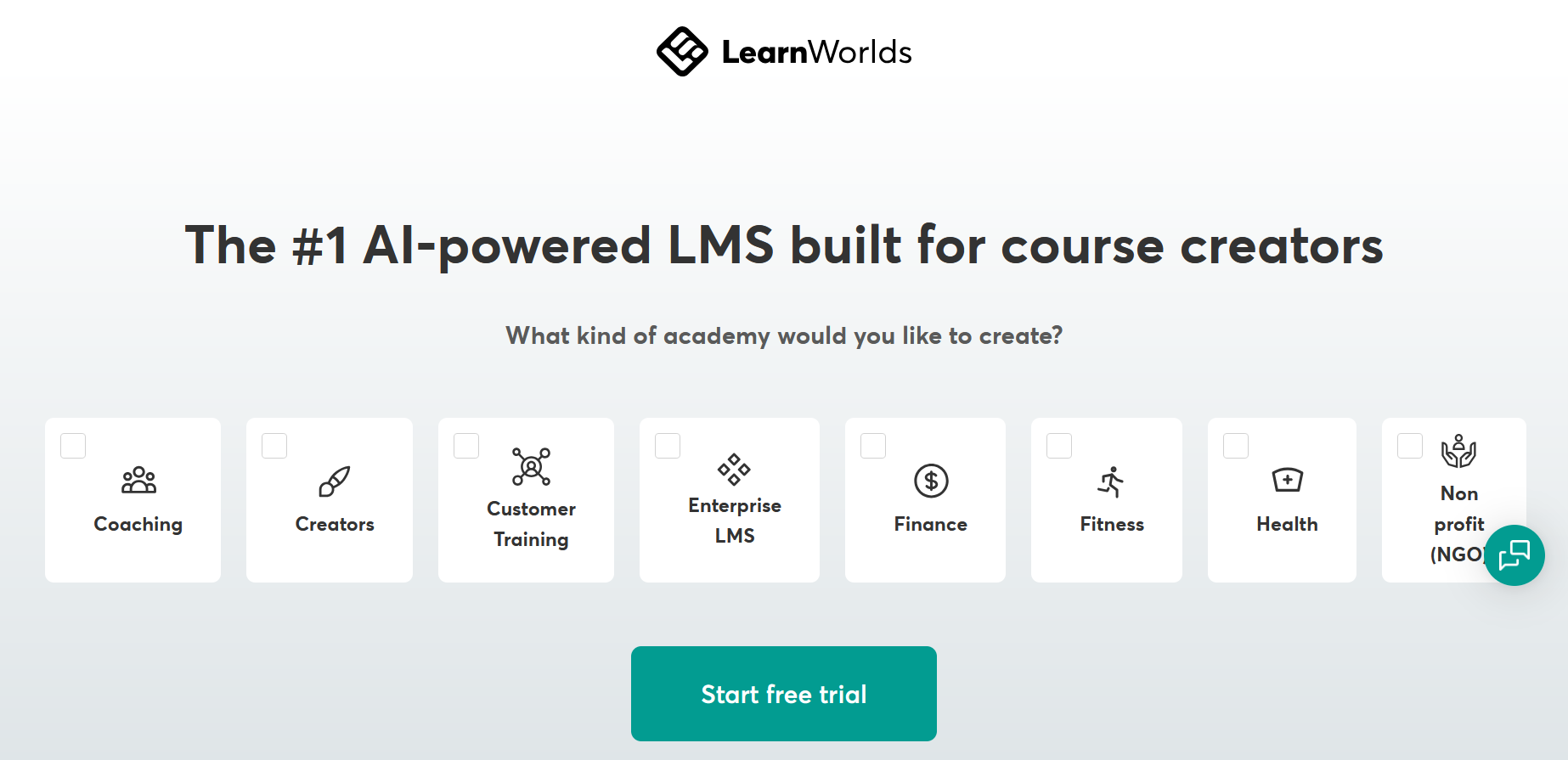
Key features:
- The built-in designer allows you to develop an unlimited number of courses and fill them with the necessary content. Users can embed images, PDF files, audio and video clips, and add tests and certificates.
- The appearance and content of course pages are easily customized via a drag-and-drop editor. With its help, you can adjust colors, typography, buttons, and page layout, upload a logo, and add SEO parameters and third-party code.
- The convenient dashboard contains information about all created courses and a lot of other data, systematized by thematic categories. In particular, these are materials for creating courses and landing pages, a collection of videos, frequently asked questions, and more.
- You can add various activities to any of the online courses: multimedia (video, audio, PDF, E-Book, SCORM/HTML5 file, link to YouTube, SoundCloud), live classes (meetings or webinars via Zoom), questionnaires (tests, exams), certificates, embed code, link, and slide show.
- The built-in website builder is one of the most useful tools of LearnWorlds. It provides a large library of over 400 templates and allows you to edit the design layouts.
- The platform includes a number of marketing features: course packages, tiered subscription plans, coupons, etc. Course creators can launch their own affiliate program and customize its parameters.
- Integrations are available with dozens of third-party services, including Google Ads, Mailchimp, ActiveCampaign, AWeber, Moosend, and ConvertKit.
LearnWorlds offers 4 pricing plans:
- Starter – €24 per month (there is a €5 commission for selling the course).
- Pro Trainer – €79 per month (no commission).
- Learning Center – €249 per month (no commission).
- High Volume & Corporate – the cost is calculated individually and is provided upon request.
The prices listed are valid for a full year at once. If you wish to pay monthly, please note that the cost will be approximately 20% higher. Each plan comes with a 30-day free trial.
Thinkific
Thinkific is one of the best course platforms used by over 77,000 course authors as of 2024. This learning management system (LMS) has a very user-friendly and intuitive interface and offers a number of powerful tools for creating and selling online courses.

Key features:
- The course creation tools of this service are based on a drag-and-drop editor with a large catalog of pre-installed themes. Users can flexibly customize templates by adding texts, images, logos, branding elements, as well as videos, quizzes, and other content.
- Thinkific allows you to create communities for courses, fill them with publications and other content, conduct live lessons for students, send them notifications, and track comments and other activity.
- The platform gives creators the opportunity to offer subscriptions with exclusive courses, access to communities, and premium content.
- With this service, you can sell course packages and additional services and conduct cross-selling. In addition, authors can use coupons, widgets, an affiliate program, and other marketing tools to increase income.
- Built-in AI technologies automate processes like creating lesson texts, summaries, and quizzes, and help organize and manage them more efficiently.
- Analytics and reporting tools provide detailed insights into sales, profits, and course performance, allowing you to track student progress and engagement.
- Thinkific supports a wide range of integrations, including services for email marketing, analytics, online payments, and a number of other external systems.
- In addition to core courses, authors can sell additional digital products: bonus materials, extended resources, or individual services.
- There are different payment options available for educational content: one-time or monthly payments, as well as membership fees.
Thinkific offers four pricing plans:
- Free (1 course and 1 community).
- Basic – $36 per month.
- Start – $74 per month.
- Grow – $149 per month.
The prices indicated are valid on the condition of payment for the whole year at once. If you pay every month, the cost will be 25% higher.
Whop
Whop is an all-in-one course platform that lets you create, promote, and sell online courses while running your community (chat, forums, livestreams) in the same place. The Courses app supports multiple lesson types, assessments, progress/completion, and analytics, so you can launch a structured learning hub fast—and then layer on a hosted store page, marketplace exposure, or an embeddable checkout for your existing site.
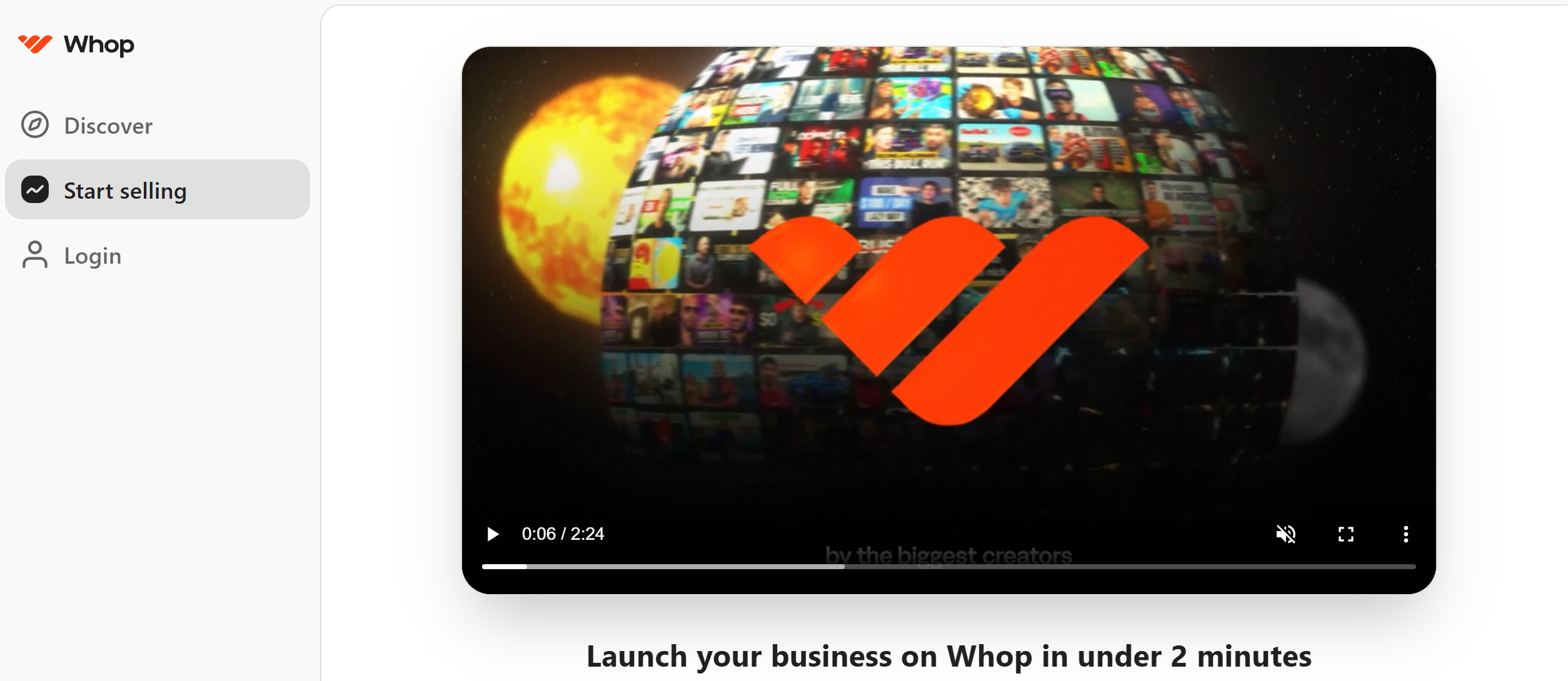
Key features:
- Course builder with lesson types: multimedia, text, video, PDF, knowledge check, and quiz.
- Lesson scheduling, course completion tracking, anti-leak protections, and course/lesson analytics.
- Community tools via Apps (Forum, Livestream) to boost engagement around your course.
- Hosted store page with optional marketplace (Whop Discover) for extra visibility.
- Embeddable checkout to sell from your own website.
Pricing: No monthly subscription—pay-as-you-go. Standard card processing is 2.7% + $0.30 per successful transaction.
Teachable
Teachable is often found in the ratings of the most popular online learning platforms. This LMS is in demand among course authors due to its tools that help create and sell educational content, advertise it, and increase audience engagement.
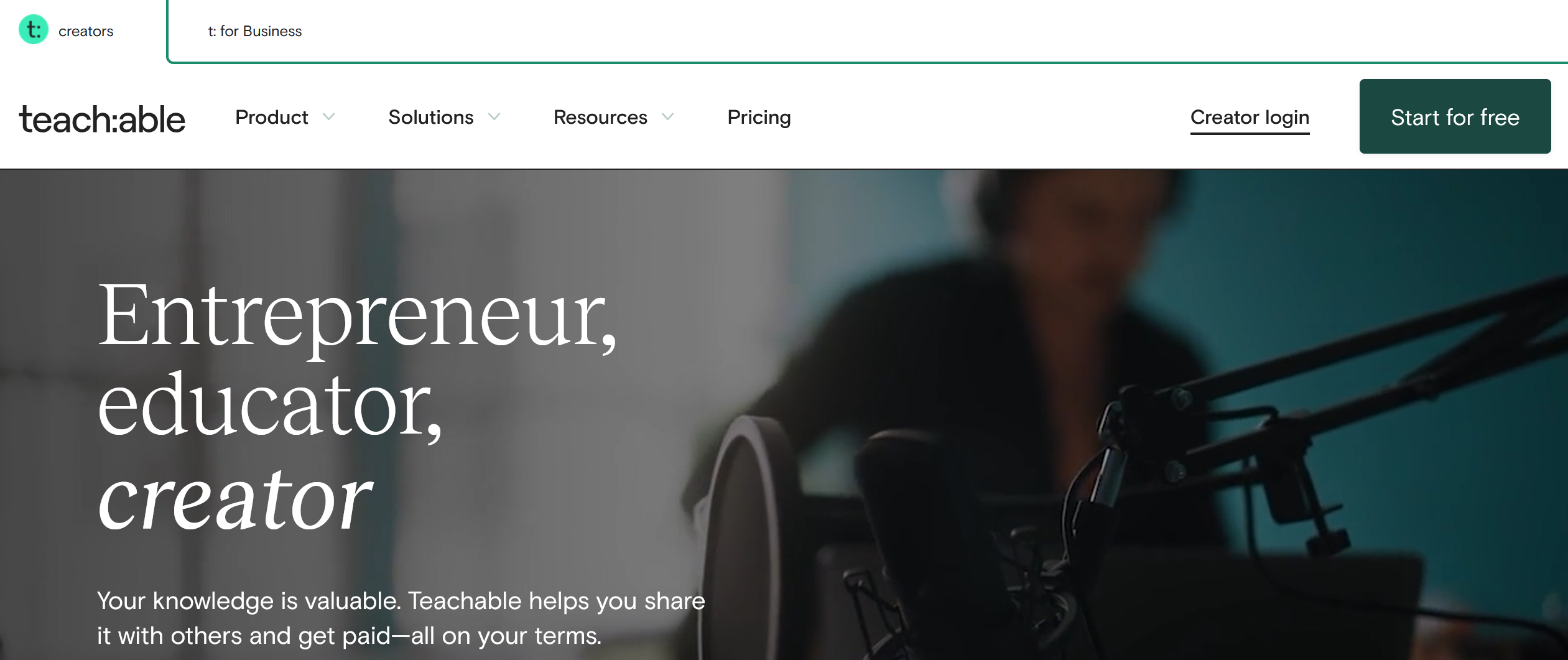
Key features:
- The course builder allows you to add various types of data to your courses: text, images, video, audio, PDF, quizzes, HTML code, and more.
- The platform offers unlimited hosting for any content, including videos.
- Each course can be divided into sections and lessons for the convenience of students. Lessons can be added to the course one by one or in groups; then the system will automatically structure the content.
- Teachable supports bulk editing of content, import from cloud storage (Google Drive, Dropbox, OneDrive), or other courses created by the author on the platform.
- Users have access to a range of AI-enabled tools: generators of course summaries, curriculums, quizzes, subtitles, as well as an AI assistant for writing lesson texts.
- In addition to courses and lessons, the platform supports communities with sections and topics. Each topic can be supplemented with images, videos, PDFs, other content, and tags for categorization and easy searchability.
- Teachable is one of the course platforms that allows course authors to conduct live classes with their audience via Zoom. To do this, they need to add the appropriate block to the class program and set the date and time.
- Additional digital products are available on the service's dashboard: personal coaching programs, course packages, memberships, and downloadable files (videos, PDFs, e-books, etc.).
- Users can develop websites for their online courses and landing pages to sell them. The platform offers its own hosting, free SSL certificate, custom domain connection, and template design customization.
Course authors using Teachable are offered a choice of 4 pricing plans:
- Free ($1 plus 10% commission on course sales).
- Basic (5% commission on course sales) – $39 per month.
- Pro (no commission) – $119 per month.
- Pro+ (no commission) – $199 per month.
- Enterprise – the cost is calculated individually and is provided upon request.
The prices listed are valid if you pay for the entire year at once. If you prefer to pay monthly, the cost will be higher.
Payhip
Payhip is an all-in-one e-commerce platform that is rightfully considered one of the best course platforms today. It has over 130,000 registered sellers. One of its main areas of application is the development and sale of online courses, as well as other digital (paid downloads, memberships, course packages, coaching) and physical goods.
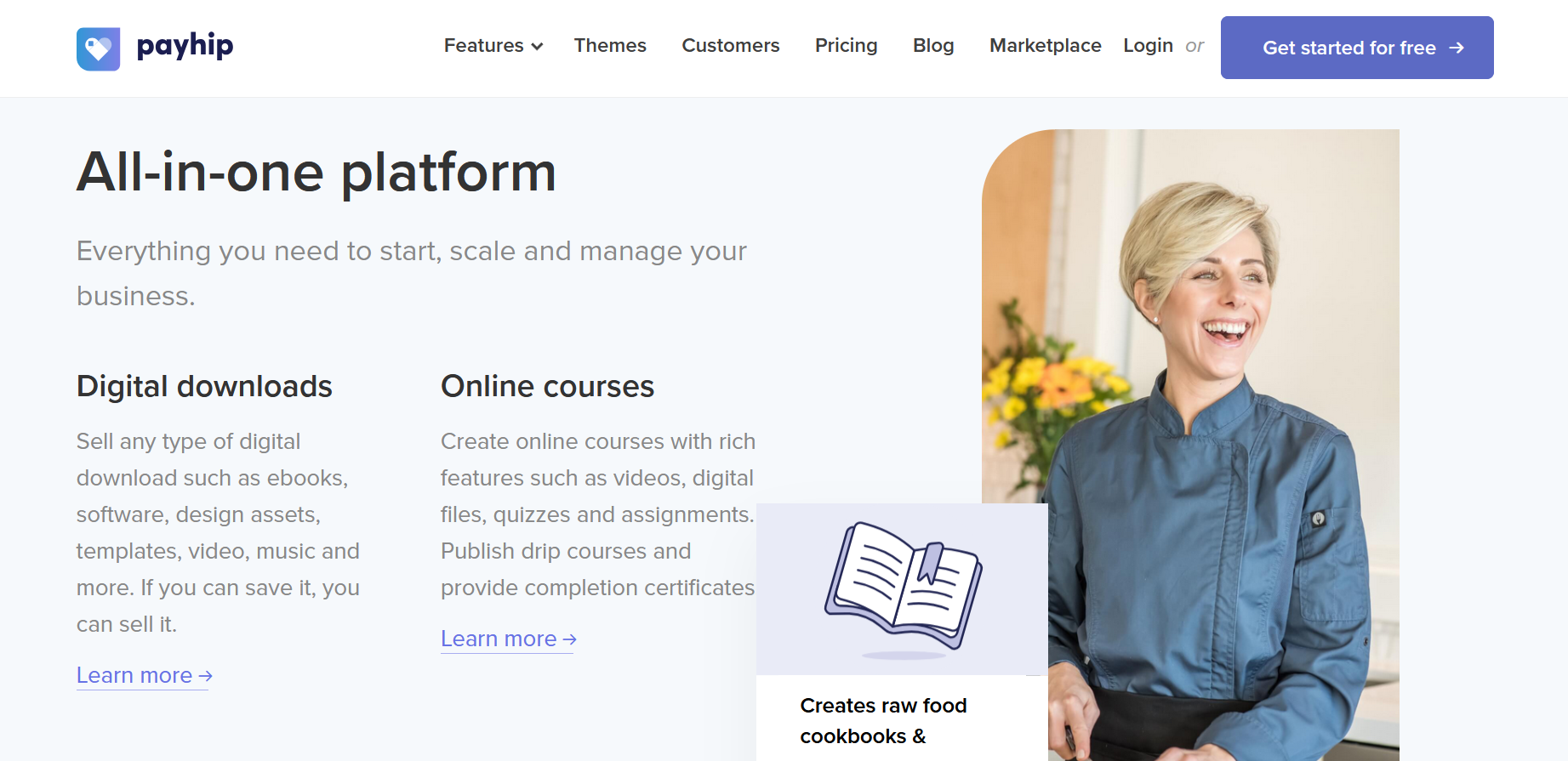
Key features:
- Course creation software has a built-in online store builder. It allows you to quickly and easily create a professional website for selling courses with branding, SSL, and a custom domain.
- The course designer helps to flexibly design its structure with sections and lessons, as well as fill them with content: text, video, quizzes, surveys, and more.
- The platform provides a range of marketing tools: coupons, email newsletters, cross-selling, and an affiliate program.
- With built-in analytics tools, course authors can track sales, visits, and other KPI metrics. This data can be visualized through graphs and charts.
- Payhip allows you to set up different payment formats for educational content: one-time payments, plans, subscriptions, etc. In addition, pre-order and free preview are available.
- Course creators can offer their audience memberships for access to exclusive content and additional services. Billing can be weekly, monthly, quarterly, or for other periods.
- The platform supports integration with PayPal and Stripe, allowing students to pay for courses using bank cards and other payment instruments.
- Built-in web hosting provides unlimited bandwidth, unlimited storage (upload files up to 5GB), and a free SSL certificate.
Payhip offers a free plan called Free Forever, which charges a 5% commission on sales. In addition, the service offers two paid plans:
- Plus (2% sales commission) – $29 per month.
- Pro (no commission) – $99 per month.
Podia
Among the learning platforms, Podia deserves special attention. This service is known for its simple, convenient, and at the same time powerful functionality. With its help, authors can easily develop and provide the audience with online courses, webinars, and other types of digital products.
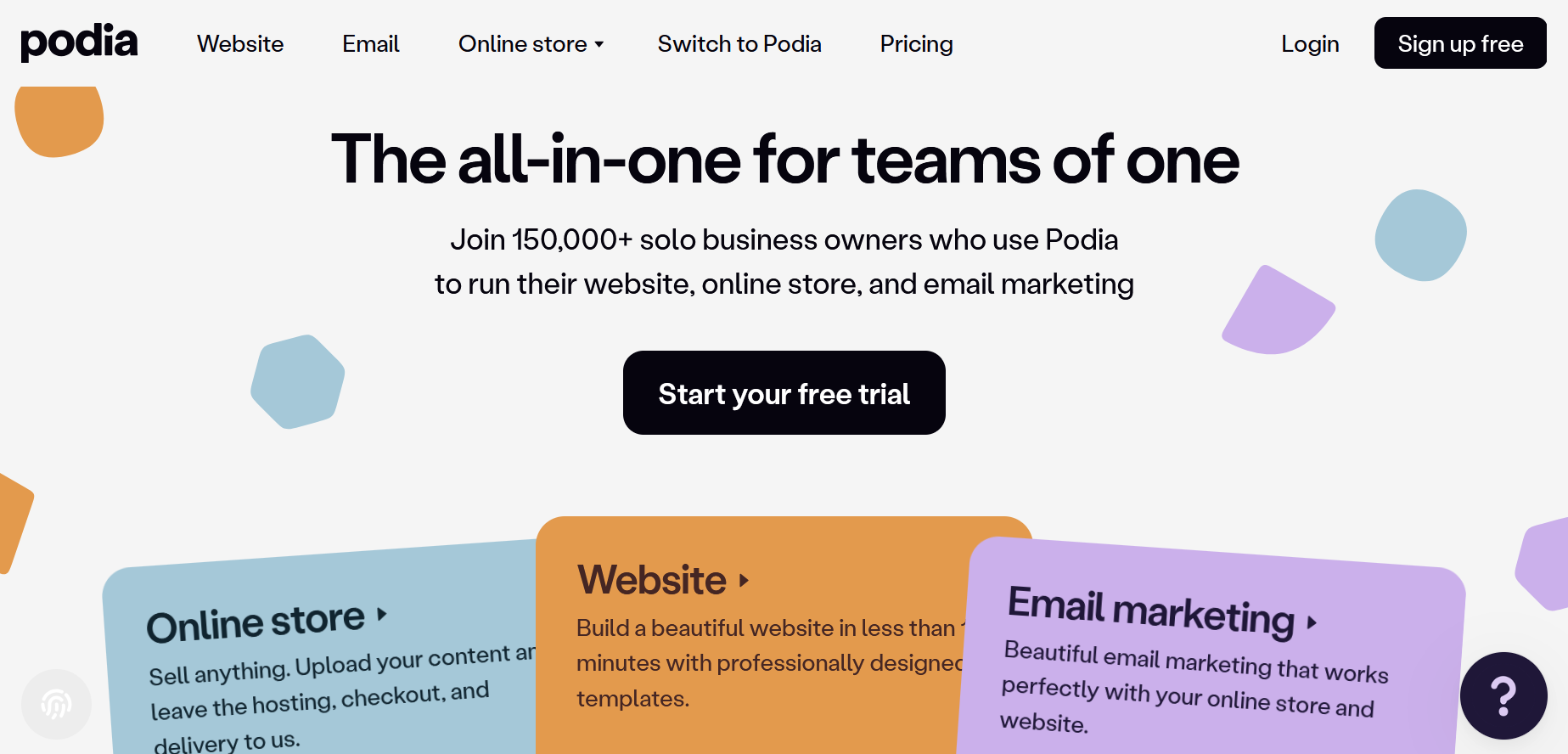
Key features:
- The built-in drag-and-drop editor allows you to quickly and easily create courses, filling them with sections and lessons. Various content formats are supported: audio, video, text, quizzes, downloadable files, and more.
- During the course creation process, users can bulk upload files of any type (including videos) to the platform's hosting with unlimited storage.
- Podia lets you create professional websites to promote your courses. In addition to hosting, you get an SSL certificate, a free second-level domain, and the ability to connect your own first-level domain.
- The block-structured web page editor contains an impressive list of ready-made blocks: product banners, course descriptions, author biography, email forms, pricing plans, FAQs, and so on.
- The platform offers a built-in text editor and other blogging tools. With their help, you can format content, add images and videos, and specify SEO parameters.
- Marketing features allow you to set up your preferred payment format (one-time payment, monthly or annual subscription payment) and set a discount on certain courses. Integrations with PayPal and Stripe are available for accepting online payments.
- Course authors can promote their products through an affiliate program, the terms of which (including the percentage of commission to partners) are configured through a separate dashboard.
Podia offers 3 pricing plans with a 30-day free trial period:
- Mover (5% sales commission) – $33 per month.
- Shaker (no commission) – $75 per month.
- Podia Email (email marketing plan) – price depends on the number of subscribers.
The prices listed are valid if you pay for the entire year at once. If you plan to pay monthly, please note that the cost will be higher in this case.
Final Thoughts
The services discussed in the article are considered the most popular online learning platforms for students and course authors in 2024. Their functionality allows users to easily develop their own courses, fill them with a variety of content, and monetize their expertise in various ways. As for the cost of using these LMS, on average, it ranges from $25 to $75 per month. No less important is the commission percentage from course sales, which directly depends on the selected tariff. To get acquainted with their capabilities, some platforms offer a free plan or a 30-day trial period.
If you are interested in implementing automation and increasing productivity, take a look at our service SaveMyLeads. You don't need any special knowledge. Explore examples of setting up integrations:
